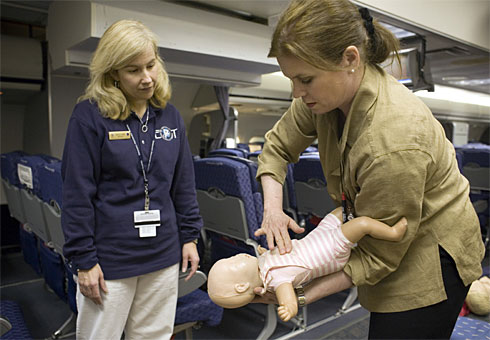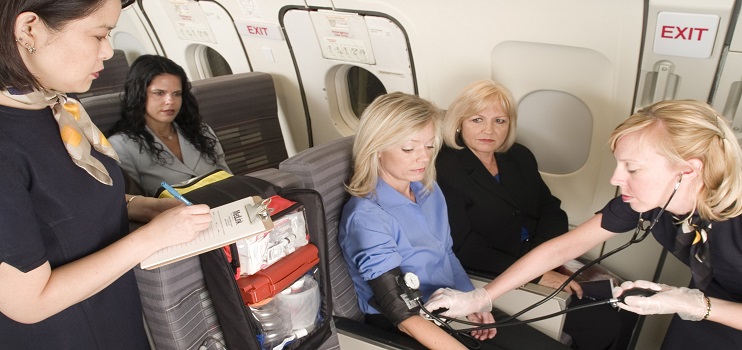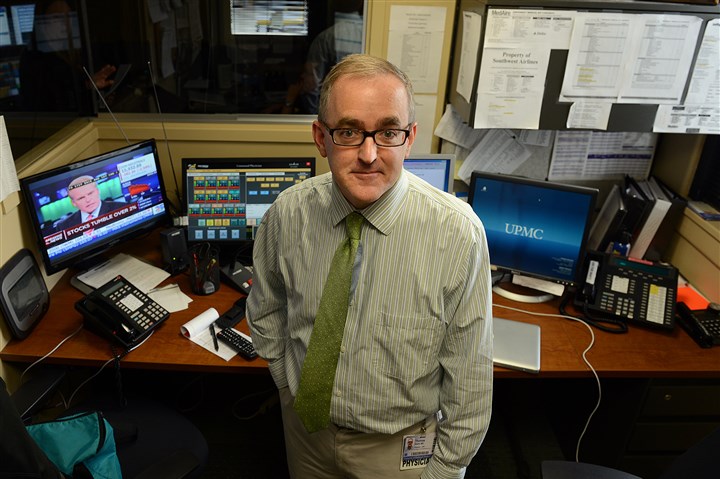
With the arrival of the Ebola virus in the U.S., a fever or upset stomach on a crowded jetliner now risks escalation into an Ebola alarm.
U.S. Centers for Disease Control and Prevention quarantine specialists rushed to assess a passenger illness 17 times in the past two weeks, more than twice as many as a year earlier. Yesterday, five fliers with flu-like symptoms were hustled off an Emirates Airline jet in Boston. Ebola wasn’t involved.
Flight crews and travelers alike are on alert after the first confirmed infection on U.S. soil. The concern is showing up in inquiries to a medical consultant that works with airlines, an aircraft-cleaner strike that a union tied to Ebola and the better-safe-than-sorry reactions to messes from onboard illnesses that once might have earned just a vigorous scrubbing.
“If there’s any vomiting, we’re getting calls about it,” said T.J. Doyle, medical director of Pittsburgh-based STAT-MD, which works with Delta Air Lines Inc. and about 20 other carriers. “It’s not that we weren’t getting these calls before. It’s just that there’s a heightened sense because of Ebola.”
The responses by CDC staff at quarantine stations, primarily at airports, in the two weeks through yesterday outstripped seven in the year-earlier period, Jason McDonald, a spokesman, said today.
Dallas Case
The latest Ebola case is a Dallas nurse involved in treating the Liberian man who flew to the U.S. in September and died last week. That initial patient, Thomas Eric Duncan, wasn’t showing any symptoms when he left Monrovia, the Liberian capital, last month.
STAT-MD has a physician on duty at all times to deal with inquiries from airlines and is hearing from flight and ground crews about passengers with worrisome chills or diarrhea, Doyle said in a telephone interview. The company is affiliated with the University of Pittsburgh Medical Center.
“On the passenger side, I think there’s anxiety,” Doyle said yesterday. “On the crew’s side, I think there’s awareness and perhaps concern.”
Months ago, when Ebola was confined to West Africa, the only airline employees seeking advice or reassurance were those traveling to or from the affected countries, Doyle said. Now, Ebola is a constant topic.
‘Top Concerns’
“We are getting probably two, three, four a day over the last 10 days,” Doyle said. “Any time that someone has had a symptom in-flight, Ebola has been one of the top concerns.”
Airlines are working to calm passengers’ fears, reiterating statements from the U.S. Centers for Disease Control and Prevention that Ebola isn’t airborne and that airline passengers aren’t at great risk.
“At this point, travel is strong and there is no reason people should avoid flying,” said Southwest Airlines Co. Chief Executive Officer Gary Kelly, who is chairman of the Airlines for America trade group. “We and the industry are very well prepared to deal with infectious diseases of this nature. We’ve got an established cleaning protocol and direct communication with the CDC.”
Concern that Ebola would erode demand has weighed on carriers’ shares, with the Bloomberg U.S. Airlines Index falling 15 percent this month through yesterday. The gauge rose today after six straight declines, the longest such streak since 2012.
Not Helping
“That second confirmed case in Dallas and various other headlines about aircraft landing and being met by medical professionals in full protective gear certainly doesn’t help,” said Fred Lowrance, an analyst with Avondale Partners LLC in Nashville, Tennessee.
In yesterday’s incident in Boston, five passengers were removed from Emirates Flight 237 from Dubai and taken to a hospital, said Matt Brelis, a spokesman for the Massachusetts Port Authority, the operator of Logan International Airport.
On Oct. 10, a Delta plane in Las Vegas was isolated temporarily because of a similar scare. That case also proved to be a false alarm.
U.S. officials began enhanced screening this weekend for arriving passengers from three Ebola-ravaged nations — Liberia, Sierra Leone and Guinea — at the first of what will be five airports.
Jet Held
A week earlier, a United Continental Holdings Inc. jet was held on the tarmac at New Jersey’s Newark Liberty after a passenger vomited, stirring concern that he was ill with Ebola. The fear proved unfounded. The flight arrived at Newark from Brussels, where Duncan changed planes for the U.S. leg of his trip from Liberia.
On Oct. 9, airplane-cabin cleaners for a Delta contractor at New York’s LaGuardia Airport briefly walked off the job. The Service Employees International Union, which is trying to represent employees at Air Serv Corp., said workers were exposed to unsafe conditions and potential hazards, including the Ebola virus. The strike was planned before the outbreak.
One frequent flier, Sherry Epley of Flagler Beach, Florida, said the Ebola scare may prompt her to forgo a European summer vacation in 2015 for the first time in 22 years. Big European hubs have more connecting passengers from Ebola-affected countries, said Epley, who is considering Canada for her trip.
“Some of my French friends are already saying, ‘Well, maybe I won’t go to Texas for a while,’” said Epley, 65, a semi-retired travel writer and photographer. “These are people who’d love to go to Texas, because they love the barbecue.”




